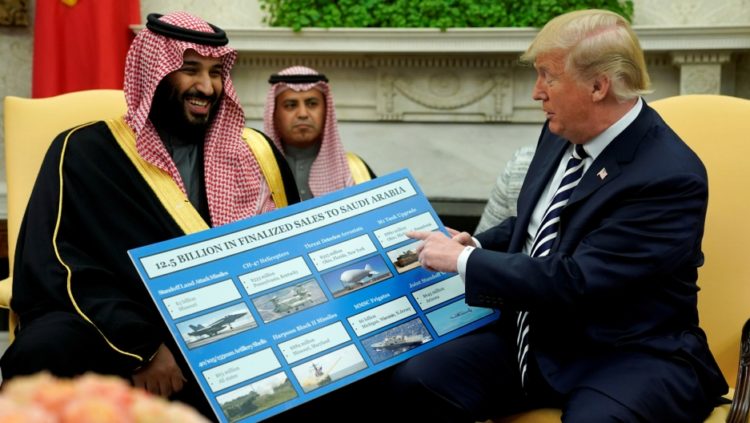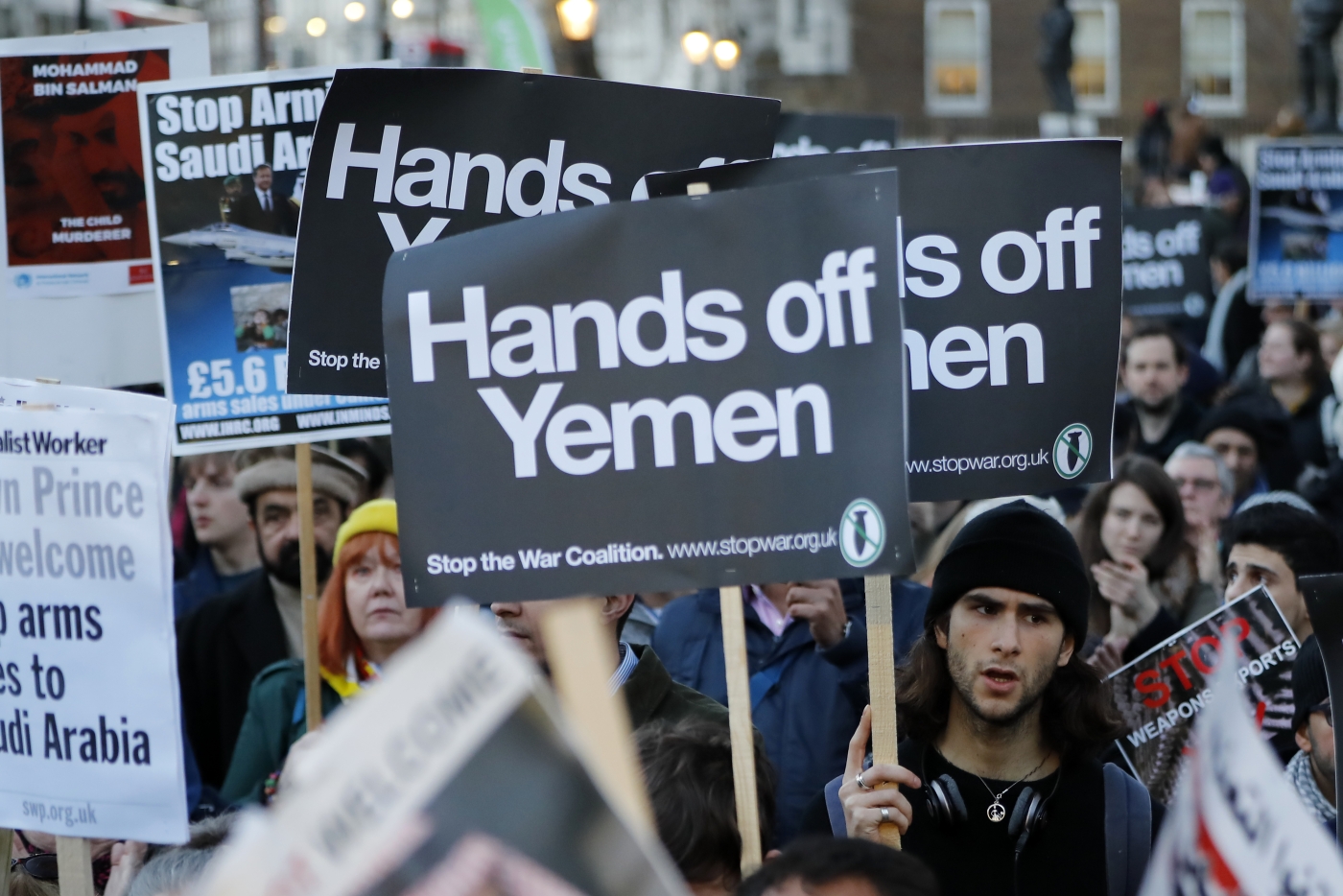
“The Biden administration in its very first weeks
committed to end US complicity in the Yemen war.
Allowing this sale breaks that commitment.”
Brett Wilkins / Common Dreams
(November 30, 2021) — Slamming the Saudi-led coalition’s war crimes in Yemen – which are often perpetrated with US-supplied weaponry — 47 advocacy groups on Monday published a joint letter to congressional lawmakers urging them to block the Biden administration’s “wrongful” planned $650 million arms sale to the repressive Middle Eastern monarchy. [See the letter below — EAW]
At issue is the proposed sale of 280 AIM-120C-7/C-8 advanced medium-range air-to-air missiles and 596 LAU-128 missile rail launchers in a package that would also include spare parts, support, and logistical services. The missiles, which would be fitted to Saudi fighter jets, are manufactured by Raytheon, on whose board Lloyd Austin sat before becoming US defense secretary this year.
The letter’s signatories urge members of Congress to pass resolutions by Rep. Ilhan Omar (D-Minn.) and Sen. Rand Paul (R-Ky.) to block the sale and end “US complicity in the Saudi-led coalition’s gross violations of international law in Yemen, including its blockade.”
“For nearly seven years, US-supported Saudi forces have unlawfully targeted civilian objects and infrastructure via indiscriminate and disproportionate attacks that have killed and injured thousands of civilians in Yemen,” the letter’s authors write. “These aerial bombardments include myriad war crimes and have exacerbated the catastrophic humanitarian crisis.”

The signers note the Saudi military’s “use of US-manufactured weapons in airstrikes” that have hit “hospitals, schools, and civilian homes — killing healthcare providers, teachers, and entire families, including children.”
The letter continues:
Despite the claim of “defensive use,” the proposed sale of these AIM-120 air-to-air missiles and hundreds of missile launchers are not exclusively defensive, and can reasonably be used to support offensive operations.
These missiles lend another tool for Saudi-led forces to maintain and enforce their brutal blockade, particularly by raising their ability to threaten aircraft that would seek to land.
More broadly, continuing to arm Saudi forces allows their grave rights violations and fueling of one of world’s worst humanitarian crises to evade accountability, and amounts to support and political cover for the illegal blockade.
70% of Casualties: Children Under Five
Last December, the United Nations Office for the Coordination of Humanitarian Affairs estimated that the Saudi-led war had caused 233,000 deaths, “including 131,000 from indirect causes such as lack of food, health services, and infrastructure” exacerbated by the blockade. Last week, the United Nations Development Program published a report projecting the war’s death toll will reach 377,000 by the end of the year, with children under the age of five accounting for 70% of the casualties.
“US involvement should have ended following [President Joe] Biden’s declaration to end US support for the coalition,” the authors assert, referring to the president’s February announcement that his administration would stop backing “offensive operations,” including weapons transfers, in the war.
“The Biden administration in its very first weeks committed both to center human rights in foreign policy and to end US complicity in the war in Yemen,” the letter concludes. “Allowing this sale to stand breaks that commitment, and would be a human rights failure.”
Brett Wilkins is is staff writer for Common Dreams. Based in San Francisco, his work covers issues of social justice, human rights and war and peace. This originally appeared at Common Dreams.

THE LETTER
Dear Members of Congress,
We, the undersigned non-governmental organizations, write in opposition to the Biden Administration’s plans to sell $650 million in air-to-air munitions to the Kingdom of Saudi Arabia. Despite claiming defensive use, the proposed arms sale risks fueling continued civilian harm by strengthening the Saudi-led coalition’s capacity to enforce its devastating air and sea blockade of Yemen.
It also risks further perpetuating US complicity in Saudi forces’ violations in Yemen, contrary to this administration’s obligations under international law and US law. We call on Congress to support Representative Ilhan Omar’s and Senator Rand Paul’s joint resolutions of disapproval to block these harmful arms sales, and end all US involvement in the Saudi-led coalition’s armed conflict and unlawful blockade in Yemen.
Approving this sale sends a message of impunity that the United States supports Saudi Arabia’s escalating policy of collective punishment, at a time when it is critical the administration heed the calls of over 100 members of Congress to use US leverage, including the halting of arms transfers and military assistance, to end the blockade and other violations against civilians in Yemen.
Roughly 20.7 million people — nearly 80% of the population — are in need of humanitarian aid, with a staggering 16.2 million Yemenis acutely food insecure and 7 million on the brink of famine. A recent Washington Post report on a Yemeni family that had to choose between which of their children would be saved from starvation illustrates the issue of the Saudi-led coalition’s control of Yemen’s airspace and “severe restrictions on the port of Hodeidah.”
For nearly seven years, US-supported Saudi forces have unlawfully targeted civilian objects and infrastructure via indiscriminate and disproportionate attacks that have killed and injured thousands of civilians in Yemen. These aerial bombardments include myriad war crimes and have exacerbated the catastrophic humanitarian crisis.

The unlawful blockade imposed by the Saudi-led coalition on Yemen has led to catastrophic impacts on fuel, food, and medical access for millions, illegally obstructing critically needed aid and assistance. Saudi fighters attacked Sana’a airport’s runway in April 2015, destroying cargo planes transporting vital humanitarian assistance.
Since 2016, Saudi Arabia has turned the airport into what aid groups have described as a “ghost terminal” by ending all flights to and from Sana’a. According to the Yemen Data Project, Saudi bombings of Sana’a airport still occur regularly, with the most recent attacks launched in March of this year. Since the Saudi-led coalition air strikes began in March 2015, human rights organizations, including Amnesty International, have extensively documented use of US-manufactured weapons in air strikes hitting hospitals, schools, and civilian homes — killing healthcare providers, teachers, and entire families, including children.
Despite the claim of “defensive use,” the proposed sale of these AIM-120 Air-to-Air Missiles and hundreds of missile launchers are not exclusively defensive, and can reasonably be used to support offensive operations. These missiles lend another tool for Saudi-led forces to maintain and enforce their brutal blockade, particularly by raising their ability to threaten aircraft that would seek to land.
More broadly, continuing to arm Saudi forces allows their grave rights violations and fueling of one of world’s worst humanitarian crises to evade accountability, and amounts to support and political cover for the illegal blockade. As noted in a recent article published by Brookings, “blockades cannot be defensive: they are offensive operations,” and US involvement should have ended following Biden’s declaration to end US support for the coalition.
Misleading claims about the defensive nature of these weapons fail to recognize that this sale would constitute continued US support for Saudi Arabia’s role in the armed conflict in Yemen. Congress must make clear that the US instead should end all support and arms transfers to parties to this conflict, namely the Saudi-led coalition—which it must pressure to end its brutal campaign in Yemen.
On May 19, 2021, 16 Senators requested that the Biden Administration “demand that Saudi Arabia allow the unfettered delivery of food, fuel, and other humanitarian aid through the Hodeidah port, under United Nations auspices to deliver humanitarian assistance to the Yemeni people. Failure to provide such access should have a direct impact on our relationship with Saudi Arabia, to include pending weapons sales.”
The impact of the continued closure of Sana’a airport has been devastating for civilians in Yemen. CARE and Norwegian Refugee Council stated that in February 2020, “28 patients were flown out of Sana’a airport on medical mercy flights for urgent treatment” but “close to 32,000 others who were on a waiting list were not so lucky” and are now “without options.”
The nearly complete halt to medical supplies entering the airport, combined with restrictions on fuel imports through Yemen’s sea ports, has caused “prices of some medicine to double, making it unaffordable for most of the population and further contributing to the decline of Yemen’s health system, already decimated by the conflict.”
Houthi forces in Yemen engaged in the armed conflict with the Saudi-led coalition have also carried out grave violations of human rights, as well as possible war crimes in attacks against civilians. Actions by Houthi de facto authorities have also exacerbated the deteriorating humanitarian crisis in the country by additionally interfering with and impeding the delivery of humanitarian assistance for civilians in need.
US government criticism and response to Houthi violations in Yemen has, however, been pronounced and consistent — criticisms that are necessary; but the same cannot be said for this administration’s response to the abuses by Saudi forces, which has been conveniently toned down in comparison.
Further, these violations by Houthi forces do not serve as a justification for continuing US involvement in the atrocities fueled by this conflict, and do not change the US ‘s obligations under international law.
In light of the Saudi’s pattern of unlawful attacks on civilians and human rights violations, the proposed sales also violate long-standing provisions in the Leahy Laws and Foreign Assistance Act that prohibit the United States from providing arms and security assistance to gross human rights violators and those restricting access to humanitarian assistance, such as the Saudi regime.
Further, the Arms Export Control Act bars the United States from providing arms transfers to foreign governments found to carry out harassment and intimidation of US residents, which Saudi authorities have repeatedly been documented to perpetrate, prominently in the assassination of Jamal Khashoggi.
These wrongful sales risk fueling further civilian harm and human rights violations in Yemen and beyond—as well as US complicity in abuses and possible war crimes. Our organizations call on Congress to support and vote in favor of Rep. Omar’s joint resolution of disapproval in the House and Sen. Paul’s resolution in the Senate, and oppose future arms sales and US complicity in the Saudi-led coalition’s gross violations of international law in Yemen, including its blockade.
The Biden administration in its very first weeks committed both to center human rights in foreign policy and to end US complicity in the war in Yemen; allowing this sale to stand breaks that commitment, and would be a human rights failure.
Posted in accordance with Title 17, Section 107, US Code, for noncommercial, educational purposes.